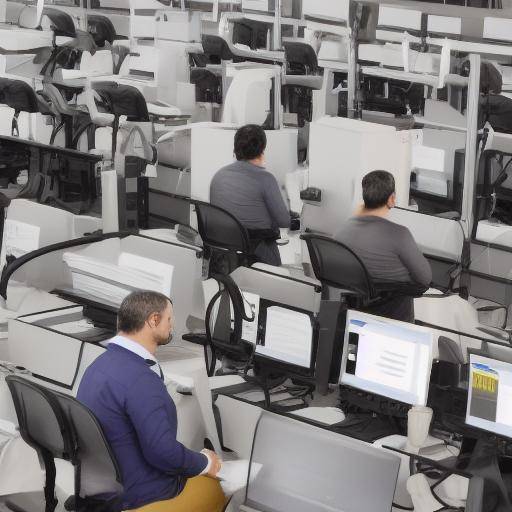
Introduction
In a world full of distractions and responsibilities, self-discipline and time management are vital skills for personal and professional success. Developing the ability to keep the focus on our goals and priorities, and managing our time efficiently, can make the difference between achievement and stagnation. In this article, we will explore in depth the importance of self-discipline to maintain effective time management and how these skills are closely related to productivity. Throughout the content, you will find practical advice, relevant data and expert perspective to help you improve your self-discipline, optimize your time management and achieve higher levels of productivity.
History and Background
Self-discipline is a concept that has been fundamental throughout history. From ancient civilizations to the modern era, the ability to control impulses and maintain the course has been valued in different cultures and contexts. In ancient philosophy, figures such as Socrates and Aristotle discussed the importance of self-discipline to achieve virtue and wisdom. During the medieval period, self-discipline was considered a fundamental virtue for spiritual and moral development.
Over time, self-discipline has been studied in various disciplines, including psychology, neuroscience and sociology. These research has shed light on the mechanisms that underlie self-discipline, revealing its importance for achieving long-term goals and emotional well-being.
On the other hand, time management has evolved significantly throughout history. From the first methods of time measurement in ancient civilizations to the industrial revolution, where efficiency in production became a key factor, humanity has consistently sought to optimize the use of time.
In the contemporary sphere, time management has become a crucial aspect for both personal and professional life. The proliferation of technologies and the acceleration of the pace of life have created the need to develop effective strategies to manage multiple daily tasks and responsibilities.
Analysis in Deep
Self-discipline and time management offer a wide range of benefits, both individually and collectively. From an individual perspective, self-discipline allows to keep the focus on long-term goals, resist distractions and overcome procrastination. In the professional sphere, self-discipline is fundamental for productivity and achievement of objectives within a working environment.
Efficient time management, for its part, helps to reduce stress, increase efficiency and facilitate the achievement of goals. In addition, adequate time management can improve the reconciliation between working and personal life, generating a positive impact on general well-being.
Despite these benefits, both self-discipline and time management present significant challenges. Lack of self-discipline can lead to procrastination, lack of motivation and inability to keep the focus on goals. On the other hand, poor time management can result in the accumulation of tasks, exhaustion and decreased performance.
Exhaustive examination
Practical implementation of self-discipline and time management requires specific strategies and strong personal commitment. Setting clear goals, prioritizing tasks, setting boundaries and developing healthy habits are key elements for strengthening self-discipline and improving time management.
The establishment of routines, the implementation of time management techniques and the use of digital tools can contribute significantly to optimize time management in the workplace. Likewise, the ability to say "no" in a plastering manner of clear limits is essential to protect time and personal energy, avoiding exhaustion and over-requirement.
Comparative analysis
It is important to note that self-discipline, time management and productivity are closely interrelated. Self-discipline provides the ability to respect schedules and commitments, which in turn facilitates effective time management. Better time management leads to greater productivity, as it allows maximizing performance in a given time frame.
Practical Tips and Accessible Tips
To strengthen self-discipline and improve time management, consider implementing the following strategies:
- It sets clear and attainable goals.
- Prioritize your daily tasks.
- Use time management techniques such as Pomodoro technique.
- Set limits to protect your time and energy.
- Implement daily routines that support your goals.
- Use digital tools to efficiently manage your tasks and commitments.
It recalls that the development of self-discipline and the improvement of time management are ongoing processes that require practice and commitment.
Ideas and Opinions of Experts on Industry
According to experts in psychology and personal development, strengthening self-discipline involves training the ability to resist instant gratification and keeping the focus on long-term goals. On the other hand, leaders in time management emphasize the importance of establishing clear priorities, delegating tasks when necessary and maintaining a balance between work and personal life.
Case Studies and Real Life Applications
A relevant case study on the impact of self-discipline and time management on productivity focuses on a technology company that implemented soft skills development programs for its employees. Participants experienced significant improvements in their ability to meet deadlines, teamwork and maintain a high level of performance.
Future Trends and Predictions
As we enter the digital age and the knowledge economy, self-discipline, time management and productivity are expected to become even more important. The need to adapt to changing working environments, the efficient management of time in an increasingly accelerated world and the ability to keep the focus on long-term goals will be key to individual and organizational success.
Conclusion
In short, self-discipline and time management are essential skills that play a key role in productivity and personal well-being. Through the implementation of effective strategies, personal commitment and continuous search for improvement, it is possible to develop these skills and reach higher levels of realization. By strengthening our self-discipline and optimizing our time management, we can enhance our productivity and achieve a healthier balance between our personal and professional responsibilities.
Frequently asked questions
Why is it important to develop self-discipline?
Developing self-discipline is essential to keeping the focus on long-term goals, resisting distractions and overcoming procrastination, which directly impacts productivity and achieving personal and professional goals.
What are the main strategies for improving self-discipline?
Establish clear goals, develop healthy habits, implement emotional self-regulation techniques and maintain intrinsic motivation are effective strategies to strengthen self-discipline.
How can I improve my time management in a demanding working environment?
Prioritizing tasks, setting limits, delegating tasks when necessary, implementing time management techniques and using digital tools are key strategies to improve time management in a demanding working environment.
Is there a link between self-discipline, time management and productivity?
Yes, self-discipline provides the ability to respect commitments and schedules, which in turn facilitates effective time management. Better time management leads to greater productivity, as it allows maximizing performance in a given time frame. These skills work together to achieve optimal results.
What are the implications of not developing self-discipline and efficient time management?
Lack of self-discipline can result in procrastination, lack of motivation and inability to keep the focus on goals, which can negatively impact the quality of work and achieving goals. In addition, poor time management can result in the accumulation of tasks, exhaustion and decrease in performance, affecting the efficiency and quality of work.
How can I implement self-discipline and time management strategies effectively?
It is crucial to establish clear goals, develop routines that support such goals, use time management tools, set clear limits to protect time and energy, and seek help from external resources when necessary.
What are future trends in self-discipline, time management and productivity?
With the continuous technological evolution and demand for soft skills, these competencies are expected to become even more relevant in dynamic working environments. The ability to adapt to rapid changes, manage time efficiently and keep the focus on long-term goals will be highly valued competencies in the future.
How can self-discipline and time management impact quality of life?
In addition to boosting productivity, these skills can reduce stress, improve work-life reconciliation, and facilitate greater emotional balance and overall well-being.
What is the first step to improve self-discipline and time management?
The first step is to realize the importance of these skills and to commit to implementing effective strategies to strengthen self-discipline and optimize time management in different aspects of life.
Final conclusion
Self-discipline and time management are fundamental pillars for productivity and personal well-being. In understanding the importance of these skills, implementing effective strategies and maintaining a continuous commitment to personal development, we can optimize our ability to achieve goals, efficiently manage our resources and enjoy a more balanced life. By strengthening our self-discipline and improving our time management, we are training to achieve success in all facets of life.






















































